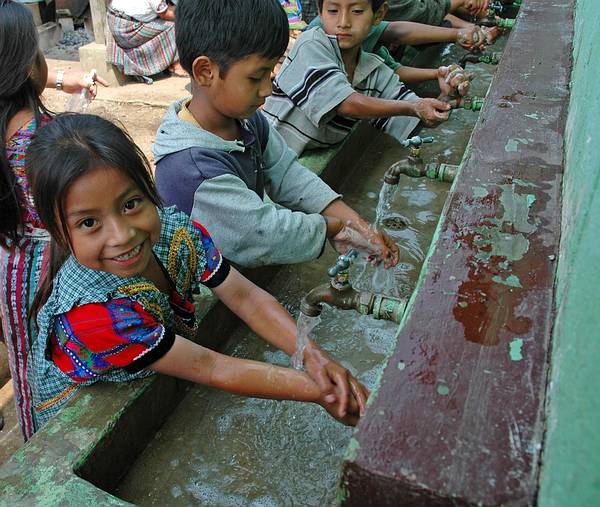On World Water Week 2010
|

In the time it takes you to read this post, another eight children in developing countries will have died from water-related illnesses.
That, I think we can all agree, is no way to start the school year.
In fact, at least 1.6 million children from developing countries won't be starting school this year, because they died over the past year from diseases related to lack of sanitation and safe drinking water. In all, nearly 300 million school days will be lost to these illnesses. An entire generation, and with it, their future economic contributions, lost to a completely preventable cause.
Next week, the safe water and sanitation world gathers in Stockholm for the annual World Water Week forum , where they will discuss the world's most urgent water related issues, exchange ideas and foster new thinking for developing communities. With a particular focus on water quality this year, PSI and partners, including USAID, UNICEF and WHO, will facilitate a seminar on increasing access to water supply, water quality, and household water treatment (HWT) options. During this Healthier Water, Healthier People session, representatives from Kenya, Rwanda and Indonesia will share their perspectives and experiences on the challenges around providing safe drinking water to their communities and talk about ways in which effective household water treatment programs can best complement water supply efforts.
Providing safe, reliable, piped-in water to every household is an important goal that yields optimal health gains. It is also a goal that is expensive to achieve, and requires a long timeframe. In the meantime, simple and inexpensive technologies exist that provide clean, safe drinking water at the home, through easily used and affordable methods of treatment and storage. Household water treatment has been shown to be one of the most effective and cost-effective means of preventing waterborne disease in development and emergency settings. Promotion of HWT lets vulnerable populations take charge of their water security by providing individuals and families with the knowledge and inexpensive tools to treat their own drinking water.
At PSI, we have experience with what works, cost-effectively and at scale, to provide clean, safe drinking water to those in even the harshest of environments. Whenever possible we embrace a total market approach, to leverage both the private and public sectors to grow the entire market for a health product or service. Our aim has been to grow the entire category of household water treatment by increasing the number of overall users through informed demand and targeted distribution of relevant products. Through this approach, we enable 17 million people around the world to drink a glass of clean water every day.
Here's an example of how this can work. In Nigeria, PSI's affiliate the Society for Family Health (SFH) promotes WaterGuard, a basic water purification solution, as a safe and affordable water treatment product. Adama lives in a rural community just outside of Abuja, called Ushafa. Her village has a poor drainage system and water supply, with people gathering water from nearby streams and shallow wells. Drinking from these often contaminated sources has led to high prevalence of diarrhea among children in the community.
After Adama lost her four year-old child to diarrheal disease brought on by drinking dirty water, she attended an educational workshop led by SFH to learn how she could prevent similar death in her other children. There, she learned about WaterGuard and the ease with which she could provide safe drinking water for her family. She immediately volunteered to work with SFH to educate others in her community about the importance of WaterGuard. Now Adama is nicknamed "WaterGuard Woman" in her community, selling an average of 450 bottles of WaterGuard a month and providing clean, safe drinking water for people in her community. She also is making a bit of money and improving her household income in the process. Adama and others like her help PSI reach some of the most vulnerable communities in the world with the tools necessary to provide their own families with clean, safe drinking water.
Despite efforts, millions continue to lack access to safe water and sanitation around the world. And even those who can access these improved sources through protected wells or other advanced systems are still at risk of being exposed to contaminated water through its unhygienic handling during transport or within the home. In Stockholm, PSI will be working to encourage continued donor support and political will around the proven, cost-effective water treatment solutions we have available now, while building the framework for permanent solutions in the future.
Drink a glass of tap water today. Remind yourself of the simple privilege it represents.
-- Karl Hofmann is President and CEO of PSI.
This blog was published on The Huffington Post and can also be accessed here.














